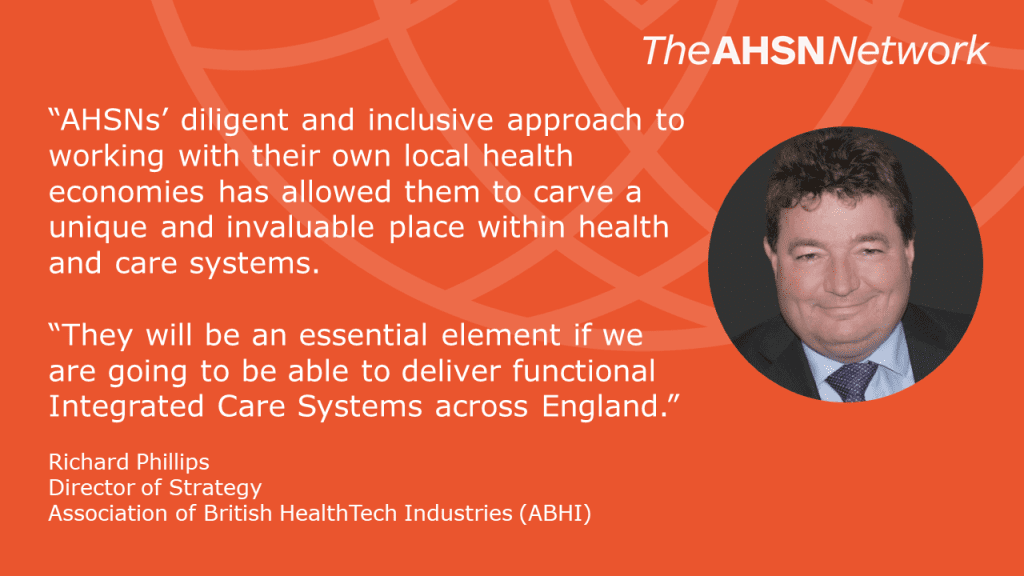Richard Phillips, Director of Strategy at the Association of British HealthTech Industries (ABHI) reflects on his experiences with the AHSN Network and how AHSNs support innovation in the life sciences sector. ABHI hosted a webinar for innovators with the AHSN Network on Thursday 30 June, 11-12am, click on the link below to watch the recording.
The ABHI has worked closely with all 15 AHSNs on innumerable pieces of work. From helping companies understand the, often convoluted, NHS landscape; encouraging innovators to strengthen their personal networks; to supporting our efforts to help UK healthtech companies export all around the world.
The AHSNs have an important role to play in helping realise the Government’s Life Sciences Vision ambition to create an outstanding business environment for healthtech companies, and we look forward to continuing the work we have done together to support inward trade missions from those looking to invest in our country.
I have been a strong and committed supporter of the AHSNs since their inception in 2013, and have served on the boards of both the West Midlands and South West AHSNs. I have always maintained that the AHSNs were the most encouraging output of 2011’s Innovation, Health and Wealth report, creating an ‘honest broker’ between industry, academia and the NHS. Their value has been demonstrated in that they have been an integral part of all subsequent initiatives in the NHS innovation space.
The journey has not always been completely smooth and we need to ensure that AHSNs can focus their resources on delivering in the areas that bring the greatest impact. In spite of the challenges, the networks – all 15 of them – have delivered outstanding value for their commissioners, and at the same time, been able to develop innovative approaches to their interactions with industry.
Their diligent and inclusive approach to working with their own local health economies has allowed them to carve a unique and invaluable place within health and care systems. They will be an essential element if we are going to be able to deliver functional Integrated Care Systems across England.
The memorandum of understanding we have with the network is very dear to us, as is the regular engagement we have with staff in the individual AHSNs. But there can never be any room for complacency in the dynamic space in which we operate.
Critically we can allow nothing to be lost in translation, which is why our joint webinar on 30 June 2022 was so important to explain the value of the AHSN Network and our relationship for those new to the sector, and perhaps more importantly, remind everyone of the impressive record of impact for NHS patients that has been delivered by AHSNs over the last decade. You can watch a recording of the webinar here.

“Health equity is the attainment of the highest level of health for ALL people. Achieving health equity requires valuing everyone equally with focused and ongoing societal efforts to address avoidable inequalities, historical and contemporary injustices, and social determinants of health — and to eliminate disparities in health and health care.” (health.gov) Within the NHS there [...]

Sickle cell disease (SCD) is a serious and lifelong health condition. People with SCD produce unusually shaped red blood cells that can cause problems because they do not live as long as healthy blood cells and can block blood vessels. This can result in suffers experiencing painful episodes, called sickle cell crises, as well as anaemia, [...]

At the Royal Society of Medicine’s Tackling Inequalities conference it was clear from the passion in the room that great progress has been made across the system to better support some of our most under-served communities. To maintain this momentum, we must not just embed tackling health and healthcare inequalities in all that we do, [...]







